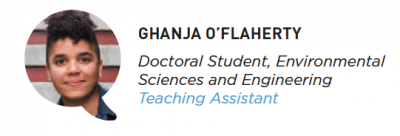Perspectives from Faculty and Students
October 8, 2018
 I’m excited that students in the new MPH program will get to work closely with students from different backgrounds–biostatistics, epidemiology, leadership, maternal and child health, and others. You learn so much when you build bridges across disciplines!
I’m excited that students in the new MPH program will get to work closely with students from different backgrounds–biostatistics, epidemiology, leadership, maternal and child health, and others. You learn so much when you build bridges across disciplines!
 I’m one of the few MPH students in biostatistics. I know that for some people, graduate-level biostatistics can be an adjustment. I want to make sure students in the core aren’t too anxious. I want us to do everything we can to facilitate their positive experience here. I also think that being part of the core will help me learn the material in a deeper, more integrated way.
I’m one of the few MPH students in biostatistics. I know that for some people, graduate-level biostatistics can be an adjustment. I want to make sure students in the core aren’t too anxious. I want us to do everything we can to facilitate their positive experience here. I also think that being part of the core will help me learn the material in a deeper, more integrated way.
 Several of the fall 2018 MPH core course instructors – Drs. Shelley Golden, Courtney Woods, Jane Monaco and I – recorded a podcast for our incoming students. Putting it together epitomized the best parts of developing the MPH core program – and is a testament to our wonderful colleagues across multiple departments. As we discussed the classic Geoffrey Rose article, “Sick Individuals, Sick Populations,”* each of us reflected on different key ideas of the article that we ‘see’ first because of our discipline-specific training. From our conversations, we gained new perspectives that led us to better appreciate and understand the field of public health. Our goal with the new MPH core is that our students also will develop this appreciation and understanding. (*See tinyurl.com/IJE-2001.)
Several of the fall 2018 MPH core course instructors – Drs. Shelley Golden, Courtney Woods, Jane Monaco and I – recorded a podcast for our incoming students. Putting it together epitomized the best parts of developing the MPH core program – and is a testament to our wonderful colleagues across multiple departments. As we discussed the classic Geoffrey Rose article, “Sick Individuals, Sick Populations,”* each of us reflected on different key ideas of the article that we ‘see’ first because of our discipline-specific training. From our conversations, we gained new perspectives that led us to better appreciate and understand the field of public health. Our goal with the new MPH core is that our students also will develop this appreciation and understanding. (*See tinyurl.com/IJE-2001.)
 Having interdisciplinary opportunities will be great for students. This fall, they will have five big topics to select from – obesity, vector-borne diseases, maternal mortality and morbidity, substance use disorders and air pollution. Teams of students will select a location and a population for examining more deeply the scope and impact of the problem.
Having interdisciplinary opportunities will be great for students. This fall, they will have five big topics to select from – obesity, vector-borne diseases, maternal mortality and morbidity, substance use disorders and air pollution. Teams of students will select a location and a population for examining more deeply the scope and impact of the problem.
 I learn best through real-world examples and case studies. The new MPH core helps reinforce concepts we’re working to understand and allows us to explore sensitive issues that we will deal with in our future work lives. Those lessons that previously may have been only conceptual now have concrete connections – and allow us to apply what we’ve learned and build on it. The core can be a testing ground before we go out to our work in the field.
I learn best through real-world examples and case studies. The new MPH core helps reinforce concepts we’re working to understand and allows us to explore sensitive issues that we will deal with in our future work lives. Those lessons that previously may have been only conceptual now have concrete connections – and allow us to apply what we’ve learned and build on it. The core can be a testing ground before we go out to our work in the field.
 As a teaching fellow in the MPH core, I am able to participate in the development of an integrative experience for the teaching assistants (TAs). TAs will create an individual training plan so they can gain important skills in this role. They can sit down with course instructors to map the skills they want to learn and practice – and then develop approaches to fully developing those skills. We will have ongoing feedback between the TAs and instructors – that’s exciting!
As a teaching fellow in the MPH core, I am able to participate in the development of an integrative experience for the teaching assistants (TAs). TAs will create an individual training plan so they can gain important skills in this role. They can sit down with course instructors to map the skills they want to learn and practice – and then develop approaches to fully developing those skills. We will have ongoing feedback between the TAs and instructors – that’s exciting!
Meet Aleta Gaertner

Aleta Gaertner
I provide relevant tools and resources to foster innovation in curriculum design and development that incorporates pedagogical best practices. Accreditation criteria are essentially minimum standards of best educational practices for promoting successful student learning outcomes, which in turn benefit employers and society. I strive to support faculty in what has become a Gillings School brand – to exceed minimum standards by infusing passion, experience and creativity into teaching.
Using pedagogical tools helps students understand the value of competency based training and how it equips them to make an impact. One example of such a tool is the new Gillings School syllabus template. The syllabus incorporates formatting and components grounded in research in the ways students learn best. It is a map, showing students the destination and signposts that mark their journey – what and how they will learn, how they will be assessed, and how they will demonstrate competence. Faculty use the syllabus template as a course design and development tool to show students the full arc of the learning experience.
I am delighted to partner with colleagues at the number one public school of public health. Together, we are working to assure accessible, exceptional training that empowers students to improve the public’s health.
Carolina Public Health is a publication of the University of North Carolina at Chapel Hill Gillings School of Global Public Health. To view previous issues, please visit sph.unc.edu/cph.
